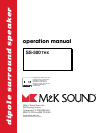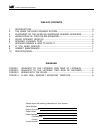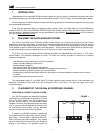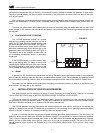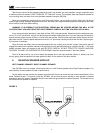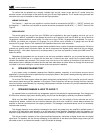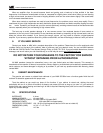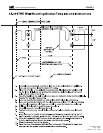
To confirm that the speakers are correctly installed right and left, check to see that the 5" woofer facing the
television screen is at the bottom of the baffle for both the Left and Right speakers. The 5" woofer facing the back wall
should be at the top of the baffle for both the Left and Right speakers.
WIRING THE SS-500
The Positive ( + ) lead from your amplifier or receiver should be connected to the RED ( + ) "INPUT" terminal, and
the Negative ( — ) lead from your amplifier or receiver should be connected to the BLACK ( — ) "INPUT" terminal. See
Figure 3.
SPEAKER WIRE
The sound quality that you get from your SS-500s can be affected by the type of speaker wire that you use to
connect them. While it is possible to use speaker wire as thin as 22 gauge to hook your SS-500s up, wire of less than
16 gauge will compromise their sound quality. For wire runs of up to 10 feet, 16 gauge wire is acceptable. For runs up
to 20 feet, you should use a minimum of 14 gauge. For up to 30 feet, use a minimum of 12 gauge, and over 30 feet
should use 10 gauge. See the THX Installation and Operation Manual for more information.
There are a wide variety of premium speaker cables available from a number of specialist manufacturers. We do not
endorse any specific brand of premium cable, but we do recommend the highest quality cable that fits your budget.
Beware, though -- with cables, expensive is not always better. If you have any questions, contact your M&K Home THX
dealer for advice.
Regardless of the speaker wire you choose to use, we have provided a method for you to conceal that wire along
the side of the SS-500 that is in contact with the side wall. A channel has been routed into the cabinet baffle that
contains the speaker input terminals. This channel runs from the top of the cabinet to the bottom of the cabinet, and
allows wires to be run between the cabinet and the wall from either above or below. Wires run through this channel are
not visible in the room, making for a much cleaner and more attractive installation.
6. SPEAKER PHASING TEST
In any system using a subwoofer separate from Satellite speakers, especially in multi-channel surround sound
applications, a phasing test must be performed to insure proper phase in the system, thereby achieving optimum sound
in the critical bass frequencies.
For a Home THX Audio system, follow the system instructions provided with the THX controller, as you will need to
have correct phase among all the speakers in the system. These instructions will take you through the front channels,
surround channels, and subwoofer, by comparing phase between individual channels until you have established that all
units have identical phase.
7. SPEAKER DAMAGE & HOW TO AVOID IT
An important factor to consider with any loudspeaker system is the potential for speaker damage. Even though your
SS-500s have extremely high power handling ability, they still can be damaged by relatively low powered amplifiers.
While very few M&K Satellites are actually returned for service, the vast majority of those returned are not for
manufacturing defects. Instead, they are returned because they have been overdriven, almost always because the
amplifier or receiver used was driven into clipping distortion. This damage is considered abuse, and is not necessarily
covered under warranty.
This clipping distortion occurs when the demands of the music are greater than the amplifier's available power. It
can occur at 20 watts with a small amplifier, or at 400 watts with a large amplifier. Regardless, when this happens, the
amplifier's output waveform (which usually looks like a smooth arc) is "clipped" off, exhibiting a flat top instead of the arc.
This flat top contains multiples of the original amplified frequencies, sometimes at higher levels than the original
signal itself. For tweeters, this can be very damaging, as this distortion is well above the audible range, where you will
be unable to hear it, and where the tweeter is more vulnerable to damage.
DIPOLE SURROUND SPEAKER
6



